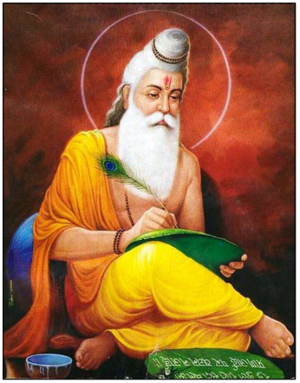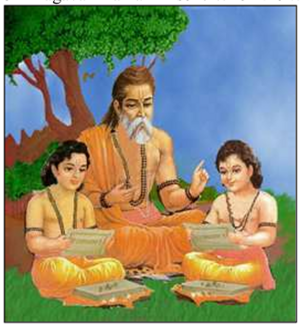Talk:Good Character
By Vishal Agarwal
In other paths to mokṣa, a good character is a prerequisite. But in Bhakti, devotion to God has an uplifting effect that saves even a sinner. This is declared in numerous Śāstra :
Even if a person of evil conduct worships Me with undivided devotion, he is to be counted amongst the righteous because he has indeed rightly resolved. Gītā 9.30
Quickly, does he become a virtuous soul and obtains everlasting peace. Son of Kuntī, know it for certain that no devotee of Mine is ever lost. Gītā 9.31
Even if a devotee of Mine, who has not obtained mastery of the senses, happens to be overcome by them, he is rescued from enslavement to them with time, as his devotion becomes mature and strong. Bhāgavata Purāṇa 11.14.18
Just as gold, molten in fire, is rid of dross and assumes its lustrous form, so too by communion through Bhakti, the soul attains to Me, being freed from all impurities arising from attachments that are born of selfish actions. Bhāgavata Purāṇa 11.14.25
Several examples can be seen in which the evil-doers became ṛṣis and sant-s by the purifying effect of Bhakti.
Maharṣi Vālmīki – The Author of Rāmāyaṇa[edit]
Ṛṣi Vālmīki is called the ‘Ādi Kavi’ or the first poet in the Sanskrit language. He wrote the Rāmāyaṇa, the story of the life of Śrī Rāma, in 24,000 verses. The Rāmāyaṇa became so popular that people across countries like Indonesia, Thailand, Burma, Laos, Malaysia, China, and Japan created versions of it. But it is the Rāmāyaṇa of Sage Vālmīki that is considered the original.
Thousands of years ago, a dacoit named Ratnākara (also called Valya Koli) lived in the forests of North India. He earned his living by robbing and killing travelers. One day, Sage Nārada was passing through the forest when Ratnākara threatened him. Nārada asked, “Why do you rob and kill?” Ratnākara replied, “To feed my family.” Nārada then asked, “Will your family share in your bad karma as they do in your loot?”
Ratnākara went and asked his wife and children. They said, “You are supposed to take care of us. But your karma is your own.” Saddened, Ratnākara realized the truth — we alone bear the results of our actions.
He returned to Nārada and asked how to become a good person. Nārada told him to sit in meditation and chant the name of Rāma continuously. Ratnākara sat in deep meditation for years. Termite hills (vālmīka) formed over him. Hence, he came to be known as Vālmīki.
A divine voice declared that Īśvara was pleased with his devotion. Sage Nārada appeared and told Vālmīki about the life of Rāma. Over time, Vālmīki became a great poet and composed the Rāmāyaṇa. His first students were Lava and Kuśa, sons of Bhagavān Rāma.
When they sang the Rāmāyaṇa before Rāma, he confirmed its truth and praised its beauty. Vālmīki’s transformation shows that even a sinful person can become a saint through sincere devotion to Īśvara. If we wish to overcome our faults, we should keep trying and pray to Īśvara. Over time, He will purify our minds.
The Past of Sant Nāmadeva[edit]
Sant Nāmadeva never attended school. In his youth, he befriended dacoits and joined them in robbing and killing travelers. However, he had the habit of visiting the Naganātha Śiva temple daily.
One day outside the temple, he saw a woman angrily scolding her son for asking for sweets. Nāmadeva intervened. The woman replied, “We are poor now. My husband was once robbed and killed by dacoits. Since then, I struggle to even feed my son.”
Nāmadeva realized that he had been the one who killed her husband. Deeply remorseful, he wept at the temple and begged for forgiveness. Bhagavān Śiva appeared to him and instructed him to go to Paṇḍharpura and serve Vithobā.
In Paṇḍharpura, Nāmadeva met many saints including Jñāneśvara. Under their influence, he transformed into a saint himself. Later, he traveled to Punjab where he lived for 20 years. The Sikhs also revere him, and many of his abhanga-s (devotional verses) are included in the Ādi Granth, the sacred scripture of Sikhism.[1]
References[edit]
- ↑ Trivedi, Krishnaji. Mahatmas Saints Sages and Seers of India and Abroad. Shivaji News Printers, 1971, pp. 149–150, Tiruchi.




